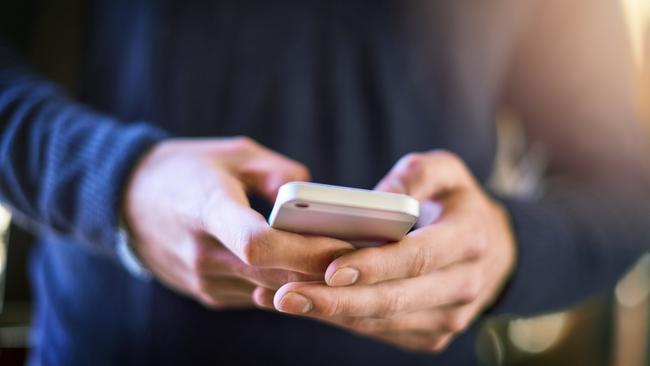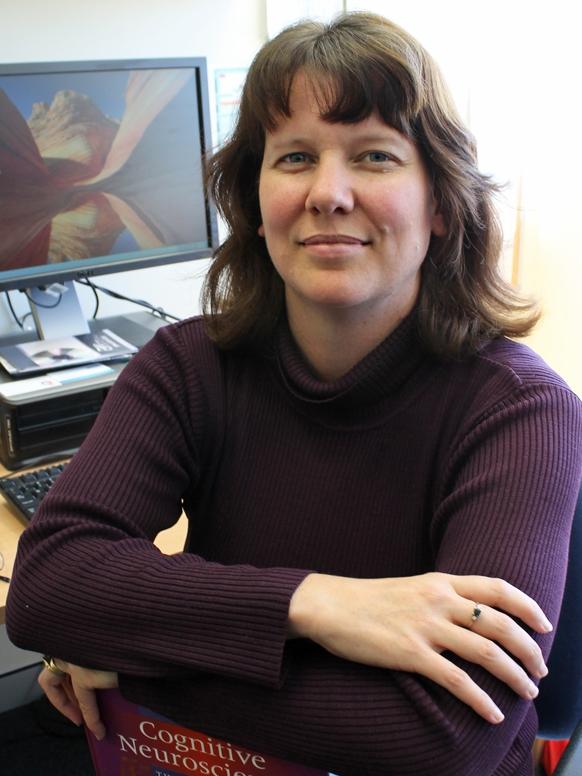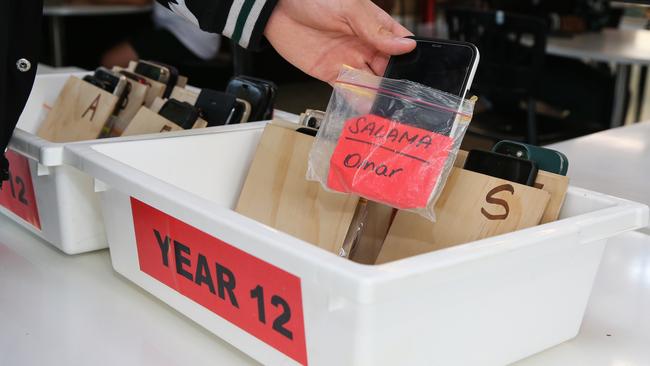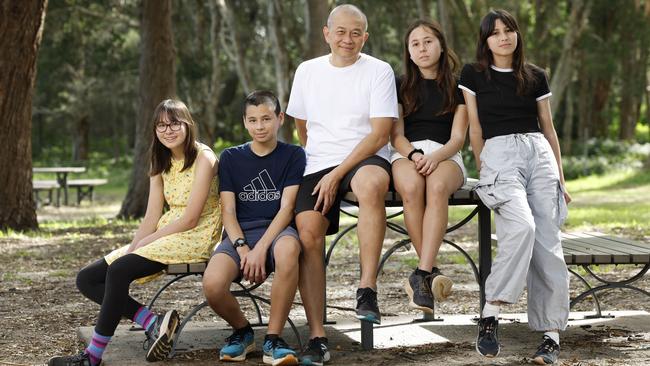‘No excuses’: Why experts say phones have no place in schools
Experts warn that excessive screen time is harming children’s development, leading to calls for a blanket ban on mobile phones in schools. What do you think? Vote in our poll.
Education
Don't miss out on the headlines from Education. Followed categories will be added to My News.
Child experts are calling for a national blanket ban on mobile phones in schools as they warn kids are struggling with basic skills in the classroom like reading for long-periods of time, critical thinking and recognising emotions on faces.
The worrying trend is starting early with children as young as 12 months struggling with basic skills like pointing, talking and being interested in humans due to excessive screen time.
NSW, Victoria, Western Australia, Tasmania, Queensland and South Australia already have blanket phone bans in all state schools but experts are calling for a national blanket ban including independent schools.
Child and teen development and psychology researcher Dr Rachael Sharman said there were absolutely no excuses for why phones should be allowed in schools.
“Both social media and its evil twin gaming are set up for very quick rewards and dopamine hits the brain. You can also expand this out to online dating,” she said.

“That ability to sit for hours reading a text and mulling over it, that ability is being eroded away from the quick fixes on smartphones.”
More than 50 per cent of children interviewed in a major Australian study said social media caused them to waste time and nearly 30 per cent said it had caused sleep deprivation.
In another study by ReachOut Australia, almost 60 per cent of parents of kids aged 12-18 said social media was a concern for them.
Dr Sharman said not only are phones creating an unnecessary distraction — they are also setting up impressionable young minds to focus on small tidbits instead of “long term critical thinking”.
“There is no place for smartphones in a school, they should be banned in all schools, no excuses,” she said.
“There needs to be separation of school learning and work and scrolling at our work.”
Child psychologist Michael Carr-Gregg is also calling for a national policy on the issue including private schools.
“I have said this to the former federal minister of education. This is my belief. If you have a mobile phone ban in a school you are going to get more social interaction, less distraction and better grades,” he said.


“Given the state of our education system shouldn’t we do anything in our power to improve the standards and remove distractions?”
“I would plead with Jason Clare to talk to principals who have done this, a consistent national ban.”
Mr Carr-Gregg said the national policy would give more clarity to teachers and principles.
“They can say, this is a national law and we’ve all subscribed to it. Some schools have an exception for recess and lunch, exception for kids in year 11/12 — this is just insane. Just ban it. Outright.”
Clinical psychologist and child and youth mental health expert Professor Adam Guastella said the funding model of social media was designed to “drag your attention away and into them” and the tactics worked effectively on children.
“Children can get used to the hit, the reward of engaging with social media. The way teachers teach doesn’t compete with that media,” he said.
Prof Guastella said there was a “neurobiological explanation” for why children were getting so distracted in classrooms.
“Kids do get more easily engaged in rewarding salient information and social media has an addictive element,” he said.
“Their funding model is to keep you engaged. From a pure science perspective, the more distractions kids have the more they are unable to sustain information in a way they can recall it.”
Psychologist Diana Kenny said kids were being lured into “hypnotic” scrolling on social media when they should be focused on school work.
“It becomes quite addictive and children become incredibly focused on scrolling through Instagram,” she said.
“They don’t often hear other people talking to them in the real world. We need kids to deal with real people in real time and in real physical spaces.”

Ms Kenny called for schools to look into restricting social media on school-provided laptops in addition to phone bans.
She is also urging education departments across the country to do more research into how these distractions are impacting children. “We need a concerted community wide approach,” she said.
“I constantly have parents coming to me about their children’s internet use, the amount they are spending on social media — it’s a really big problem.”
Academic Karl Sebire has conducted research into how people can learn in the age of distraction and said banning social media access is not the answer.
“The biggest mistake I find is stopping kids from using tech rather than teaching them healthy use,” he said.
“Technology is a necessity, without it the last couple of years of education would have ground to a halt.”
IT’S PART OF LIFE
Sydney dad Kevin Goodall has four children going to four different schools — and each school has a different policy for phone use in the classrooms.
Mr Goodall said he does not stop his children from accessing social media, phones or gaming because technology is a part of life he cannot ignore.
“I tell them when exams are on, they can access social media anytime after exams but I ask them to not spend too much time on social media because there’s less time to do other things,” he said.

Mr Goodall said he encouraged his teens to stay busy so they are not just choosing between school and their phones but also focusing on working and playing sport.
Three out of four of his teenagers said social media was diminishing their ability to focus both in the classroom and outside of it but they also used it for positive things like learning, connecting with friends and engaging in their interests.
“It’s just so easy to get lost down a rabbit hole of endless scrolling,“ 16-year-old Lana said.
“I cannot focus for more than 10 minutes before switching to Instagram on my phone.”
Luke, 15, said he only found it distracting if his phone is ”accessible and nearby” but it hadn’t “lowered his attentionspan”.
Abby, 13, said social media was “annoyingly addictive” and it was easy to waste time on it but her schools phone ban policymeant she could “focus well in class”.
“Social media has lowered my attention span which makes it more difficult to focus on schoolwork, especially long tasks,” Anna, 14, said.
The content summaries were created with the assistance of AI technology then edited and approved for publication by an editor.
More Coverage
Read related topics:Best in Class





